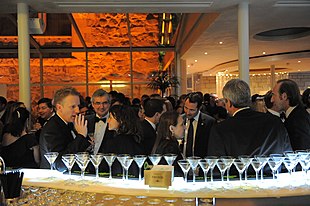
The cocktail party effect refers to a phenomenon wherein the brain focuses a person's attention on a particular stimulus, usually auditory. This focus excludes a range of other stimuli from conscious awareness, as when a partygoer follows a single conversation in a noisy room.[1][2] This ability is widely distributed among humans, with most listeners more or less easily able to portion the totality of sound detected by the ears into distinct streams, and subsequently to decide which streams are most pertinent, excluding all or most others.[3]
It has been proposed that a person's sensory memory subconsciously parses all stimuli and identifies discrete portions of these sensations according to their salience.[4] This allows most people to tune effortlessly into a single voice while tuning out all others. The phenomenon is often described as a "selective attention" or "selective hearing". It may also describe a similar phenomenon that occurs when one may immediately detect words of importance originating from unattended stimuli, for instance hearing one's name among a wide range of auditory input.[5][6]
A person who lacks the ability to segregate stimuli in this way is often said to display the cocktail party problem[7] or cocktail party deafness.[8] This may also be described as auditory processing disorder or King-Kopetzky syndrome.
- ^ Bronkhorst, Adelbert W. (2000). "The Cocktail Party Phenomenon: A Review on Speech Intelligibility in Multiple-Talker Conditions". Acta Acustica United with Acustica. 86: 117–128. Retrieved 2020-11-16.
- ^ Shinn-Cunningham BG (May 2008). "Object-based auditory and visual attention" (PDF). Trends in Cognitive Sciences. 12 (5): 182–6. doi:10.1016/j.tics.2008.02.003. PMC 2699558. PMID 18396091. Archived from the original (PDF) on 2015-09-23. Retrieved 2014-06-20.
- ^ Marinato G, Baldauf D (February 2019). "Object-based attention in complex, naturalistic auditory streams". Scientific Reports. 9 (1): 2854. Bibcode:2019NatSR...9.2854M. doi:10.1038/s41598-019-39166-6. PMC 6393668. PMID 30814547.
- ^ Cite error: The named reference
Narayanwas invoked but never defined (see the help page). - ^ Wood N, Cowan N (January 1995). "The cocktail party phenomenon revisited: how frequent are attention shifts to one's name in an irrelevant auditory channel?". Journal of Experimental Psychology: Learning, Memory, and Cognition. 21 (1): 255–60. doi:10.1037/0278-7393.21.1.255. PMID 7876773.
- ^ Conway AR, Cowan N, Bunting MF (June 2001). "The cocktail party phenomenon revisited: the importance of working memory capacity". Psychonomic Bulletin & Review. 8 (2): 331–5. doi:10.3758/BF03196169. PMID 11495122.
- ^ Cite error: The named reference
Cherry 1953was invoked but never defined (see the help page). - ^ Pryse-Phillips W (2003). Companion to Clinical Neurology (2nd ed.). Oxford: Oxford University Press. p. 206. ISBN 0-19-515938-1.